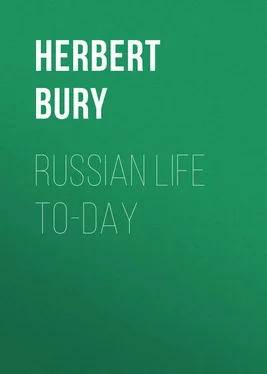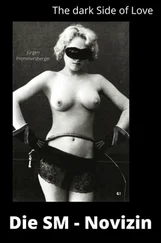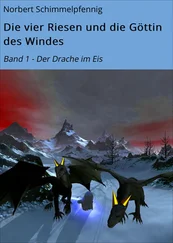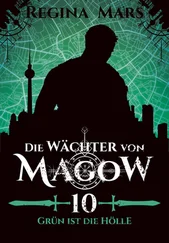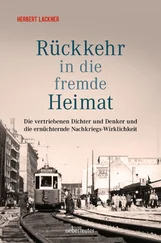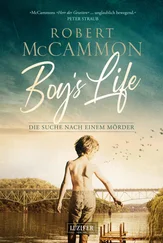Herbert Bury - Russian Life To-day
Здесь есть возможность читать онлайн «Herbert Bury - Russian Life To-day» — ознакомительный отрывок электронной книги совершенно бесплатно, а после прочтения отрывка купить полную версию. В некоторых случаях можно слушать аудио, скачать через торрент в формате fb2 и присутствует краткое содержание. ISBN: , Жанр: foreign_antique, foreign_prose, на английском языке. Описание произведения, (предисловие) а так же отзывы посетителей доступны на портале библиотеки ЛибКат.
- Название:Russian Life To-day
- Автор:
- Жанр:
- Год:неизвестен
- ISBN:http://www.gutenberg.org/ebooks/33303
- Рейтинг книги:5 / 5. Голосов: 1
-
Избранное:Добавить в избранное
- Отзывы:
-
Ваша оценка:
- 100
- 1
- 2
- 3
- 4
- 5
Russian Life To-day: краткое содержание, описание и аннотация
Предлагаем к чтению аннотацию, описание, краткое содержание или предисловие (зависит от того, что написал сам автор книги «Russian Life To-day»). Если вы не нашли необходимую информацию о книге — напишите в комментариях, мы постараемся отыскать её.
Russian Life To-day — читать онлайн ознакомительный отрывок
Ниже представлен текст книги, разбитый по страницам. Система сохранения места последней прочитанной страницы, позволяет с удобством читать онлайн бесплатно книгу «Russian Life To-day», без необходимости каждый раз заново искать на чём Вы остановились. Поставьте закладку, и сможете в любой момент перейти на страницу, на которой закончили чтение.
Интервал:
Закладка:
It is a great country, as all we who know it feel, and “It doth not yet appear what it shall be.” If some of us are right in thinking of the Russians as a great race with a vast country of tremendous resources; who can in any way picture the great and wonderful possibilities of their future? It will be my task to try and show how little opportunity they have had as yet of getting their share of modern civilization, how imperfectly, as yet, the ethical side of their religion has been imparted to them; and still, in spite of all this and of other defects of their social and religious life, how much they have accomplished in the way of real achievement.
I fail to see how any one can help feeling the greatest interest – hopeful and expectant – about their future, or feel anything else but the great thankfulness that I feel myself, that we and they as peoples have been brought so intimately together by circumstances which few could have foreseen only a very few years ago, but which have come about not only, as some would say, in the course of Providence, but in a very true sense, as I trust our and their national histories shall show in time to come, “According to the good hand of our God upon us.”
CHAPTER II
General Social Life
The whole life of the Russian people reminds those who visit them continually and in every possible way that they are in a religious country; for everywhere there is the ikon , or sacred religious picture. There are other ways, especially the columns of the newspapers full of notices of private and public ministrations and pathetic requests for prayers for the departed, of bringing religion continually before the public mind, but the ikon is most in evidence. It is a picture in one sense, for it is a representation either of our Lord or of the Holy Virgin or of some well-known saint; but the garments are in relief, often composed of one of the precious metals and ornamented in some cases with jewels; and thus it is quite different from other sacred pictures. It is the first characteristic evidence of “Russia” to meet one’s eyes on entering, and the last to be seen as one leaves, any public place.
“A great picture of the Virgin and Child hangs in the custom-house at Wirballen,” writes Mr. Rothay Reynolds at the beginning of My Russian Year , “with a little lamp flickering before it.”
“The foreigner, who was a few minutes before on the German side of the frontier and stands on Russian soil for the first time, looks at the shrine with curiosity. Porters are hurrying in with luggage, and travellers are chattering in half a dozen languages. An official at a desk in the middle of the great hall is examining passports. A man is protesting that he did not know that playing-cards were contraband; a woman is radiant, for the dirty lining she has sewn in a new Paris hat has deceived the inquisitors. Everybody is in a hurry to be through with the business, and free to lunch in the adjoining restaurant before going on to St. Petersburg. It is a strange home for the majestic Virgin of the Byzantine picture.
“Here, at the threshold of the empire, Russia placards – S. Paul’s vivid Greek gives me the word – her faith before the eyes of all comers. In the bustle of a custom-house, charged with fretfulness and impatience and meanness, Russia sets forth her belief in a life beyond the grave and her conviction that the ideals presented by the picture are the noblest known to mankind.”
Nowhere as in Russia is one reminded so constantly, in what we should consider most unlikely places, that we are in a Christian country. In the streets and at railway stations, in baths, hotels, post offices, shops, and warehouses, in the different rooms of factories and workshops, in private houses, rich and poor alike, in government houses, and even in places of evil resort which I will not specify, as well as in prisons, indeed in every public place there is the ikon – most frequently representing the Holy Mother and Child – and its lamp burning before it.
In later chapters I will write more at length upon religion and worship, but I must give the reader at once , if a stranger to Russia, something of the impression which the ubiquity of the ikon makes upon those who go there for the first time. It is always to be seen. And though I will try and describe what it directly represents in the shape of Church life later, yet from the very first I must write, as it were, with the ikon before me. I must see with my mind’s eye the Holy Mother clasping the Divine Child to her bosom, with a few flowers and a twinkling little light before them, all the time I write, whether it is of things secular or sacred, grave or gay, national or international, or I shall give out but little of the spirit which I feel I have breathed deeply into my life in that wonderful country, and certainly shall not be able to help any reader who has not been there as yet to understand why it should be spoken of as “Holy Russia.”
That which the ikon stands for, therefore, must be the spirit of every chapter I write, or I shall give my readers no true picture of Russian life.
Fortunately for those who want further particulars than such a book as this can give them – and it will fail in its purpose if it does not make many readers wish to have them – there has been a very excellent Baedeker’s Guide to Russia published last year, which is a wonderfully complete work considering the vast empire with which it has to deal. I will therefore attempt nothing at all in the way of statistics or descriptions such as a guide-book gives, or such as will be found in the excellent books to which I shall often refer. If I can take my readers with me in thought as I travel about Russia and Siberia, and can give them some of the information which has been given so freely to me, and can convey to them some portion of the impressions made upon me when far away from the beaten track, and above all can lead them to give their sympathies freely and generously to the people of the land and to our own countrymen so hospitably welcomed amongst them, and so generously treated, I shall be more than repaid for my work, and shall ask nothing better.
In Russia there are two forms of government, clearly and strenuously at work, and wide asunder in their character, the autocratic and the democratic. It is impossible to do much more than mention these two tremendous forces, which are so strongly forming the character, and determining the destinies for a long time to come, of a great people.
Since 1905 the Russian Empire has had constitutional government under the form of an Imperial Council or First Chamber, the Imperial Duma or Second Chamber, with the Emperor, advised by a small council of ministers, still an autocratic sovereign. The Emperor can overrule any legislation, and probably would if advised by a unanimous council; but it must be evident to most people if they think a little, that even now he would be very reluctant to do this except in some very grave crisis of the national life, and that in time to come he will never dream of such interference. Constitutional government in Russia has really begun, and when one considers the past it is clear that great progress has been made in the direction of constitutional freedom since it was granted in 1905. The reconstitution of the Polish nation, the stirring amongst the Finns, the rising hopes of the Jews, the national aspirations of Mongolia more and more fully expressed, the general “moving upon the face of the waters” of the Spirit which makes a free people, cannot but rivet the attention of those interested in social and national life upon Russia at this time, when the autocratic government of long standing is passing, so simply and so naturally, it would seem, into the constitutional.
Читать дальшеИнтервал:
Закладка:
Похожие книги на «Russian Life To-day»
Представляем Вашему вниманию похожие книги на «Russian Life To-day» списком для выбора. Мы отобрали схожую по названию и смыслу литературу в надежде предоставить читателям больше вариантов отыскать новые, интересные, ещё непрочитанные произведения.
Обсуждение, отзывы о книге «Russian Life To-day» и просто собственные мнения читателей. Оставьте ваши комментарии, напишите, что Вы думаете о произведении, его смысле или главных героях. Укажите что конкретно понравилось, а что нет, и почему Вы так считаете.
